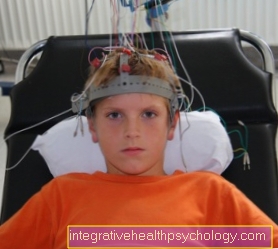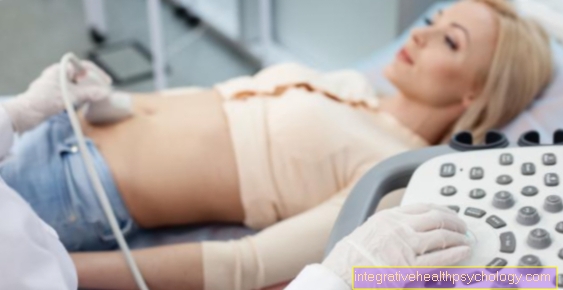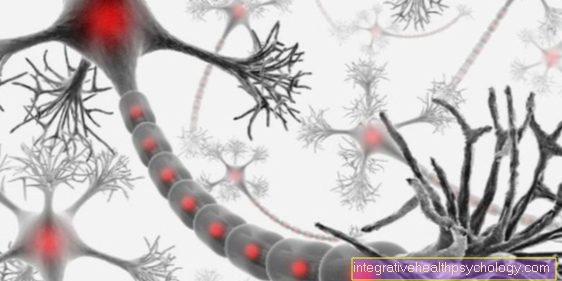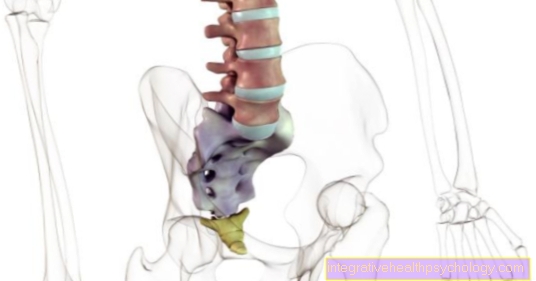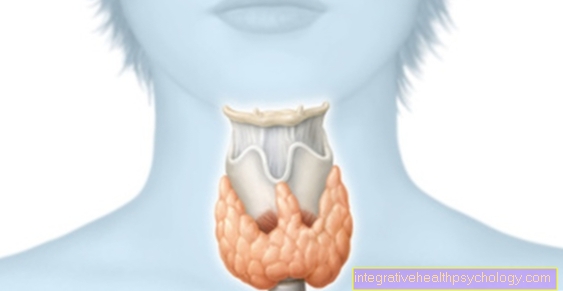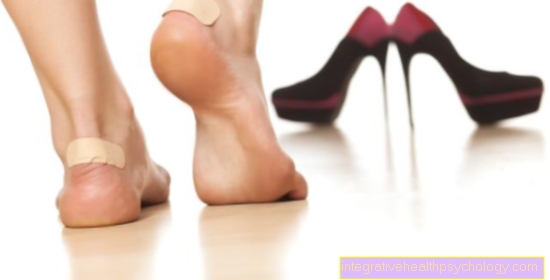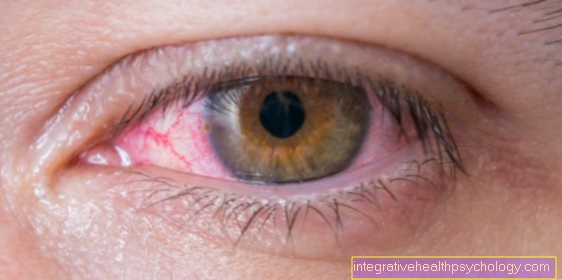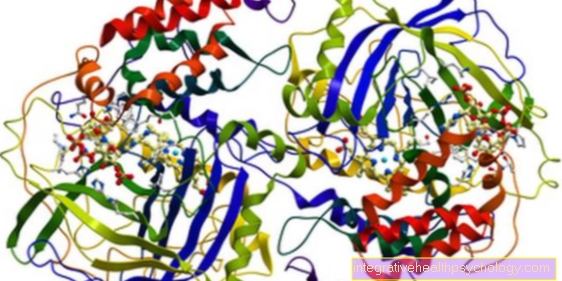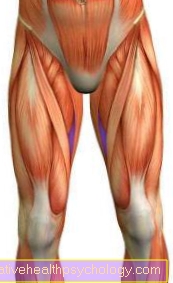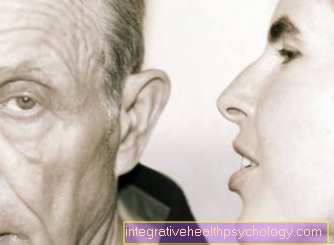Serotonin Syndrome
definition
Serotonin syndrome, also known as serotoninergic syndrome, is a life-threatening condition caused by an excess of the messenger substance serotonin. This life-threatening excess results from an overdose of medication or an unfavorable combination of different medications. Serotonin syndrome leads to symptoms such as fever, muscular overactivity and psychiatric changes. The most important differential diagnosis is neuroleptic malignant syndrome.

causes
Serotonin syndrome does not develop on its own. It is the result of an overdose of medication or an unfavorable combination of different medications. The excess of serotonin can be created intentionally, for example with the intention of harming yourself, or accidentally as part of a medically prescribed or self-medication. There is usually a risk of serotonin syndrome when using antidepressants, as these increase the concentration of serotonin. If only such a drug (monotherapy) is taken, there is usually no risk of serotonin syndrome. However, if several drugs are taken at the same time, they can influence each other (drug interaction) and thus lead to a dangerous excess of serotonin.
The trigger is usually the combination of the drug Trancylpromine, which belongs to the class of monoamine oxidase inhibitors, with other antidepressants (e.g. Citalopram, venlafaxine, clomipramine Etc.). The drug Trancylpromine inhibits the breakdown of serotonin and is also one of the antidepressants. Even when switching from Trancylpromine Serotonin syndrome can develop on another antidepressant if there is no two-week break in treatment between the two drugs. This is because it takes about two weeks for the Trancylpromins has completely disappeared. Other drugs that, in combination with one another, can harbor the risk of serotonin syndrome are opioid analgesics (Tramadol, pethidine, fentanyl, methadone), the cough suppressant Dextrometorphan and medication for nausea, like Ondansetron and granisetron. What these drugs have in common is that they increase serotonin levels in some way. This does not mean that they should never be used together, but careful consideration and precise dosing is required to minimize the risks. Drugs such as ecstasy, cocaine and LSD, especially in combination with antidepressants, can also lead to life-threatening serotonin syndrome. Also the combination of the reserve antibiotic Linezolid and antidepressants are considered dangerous and should be avoided. It was also long before the combination of antidepressants with the Triptans, which are often used for migraines. Today, however, the risk is estimated to be rather low with good medical care.
For more information about side effects of antidepressants, see our article Side Effects of Antidepressants.
Citalopram
At Citalopram It is a very frequently prescribed antidepressant that belongs to the class of so-called serotonin reuptake inhibitors (SSRIs). It increases the serotonin level by inhibiting the uptake of serotonin into the cell. Apart from depression, it is also used for other mental illnesses such as anxiety disorders and panic disorders. When taking Citalopram It should be noted that the simultaneous use of so-called monoamine oxidase inhibitors is strictly forbidden.This includes the active ingredients Trancylpromine and Moclobemide. Citalopram may not be allowed until two weeks after discontinuation of Trancylpromine and one day after the treatment at the earliest Moclobemide can be used. Otherwise there is a risk of serotonin syndrome, as these active ingredients also increase the concentration of serotonin.
More information about side effects of Citalopram see our article side effects of Citalopram.
Triptans
At Triptans are drugs that are used to treat migraines. Although they do not increase the concentration of serotonin itself, they work on an important serotonin receptor. Thereby they bring about typical effects of serotonin. They are also known as serotonin agonists. For a long time there has been a very cautious attitude towards combining Triptans with antidepressants before. In the meantime, however, the risk of serotonin syndrome with this combination is estimated to be rather low. Patients taking a combination of triptans and antidepressants must regularly consult their doctor about side effects and the current dosage so that the therapy is well monitored.
For more information on treating migraines, see our Migraine Therapy article.
Serotonin Syndrome from Alcohol

The consumption of alcohol cannot cause serotonin syndrome per se. However, regular alcohol consumption increases the risk of drug interactions and side effects. Therefore, especially patients who take several medications are advised not to consume alcohol. Especially in the case of mental illnesses such as depression or anxiety disorders, alcohol worsens the condition of those affected and disrupts the success of the therapy. There is a particularly high risk of interactions when several drugs are taken at the same time. Since the exact effects of alcohol in combination with medication cannot be predicted, its consumption should be avoided. The risk of serotonin syndrome only increases with additional alcohol consumption.
The main problem, however, is that doctors prescribe therapy with antidepressants and other drugs that affect the serotonin level on the condition that no additional drugs, drugs or alcohol are consumed without authorization. If this is the case, however, the consequences cannot be precisely foreseen and, above all, cannot be intercepted well. The patient is in an incalculable danger.
For more information about combining alcohol and antidepressants, see our article Antidepressants and Alcohol.
Serotonin Syndrome due to St. John's Wort
St. John's wort is a herbal medicine that is used in the treatment of mild to moderate depression. However, its effect is very controversial in studies. This is considered the main active ingredient in St. John's wort Hyperforinwhich probably leads to an increase in noradrenaline and serotonin levels, among other things. Basically, the effect of St. John's wort is very weak, so the risk of serotonin syndrome is low. However, it becomes problematic if, apart from St. John's Wort, other drugs are taken that increase serotonin levels. These include, in particular, other antidepressants, but also certain opioid analgesics, migraine medications, and some medications for nausea. Since St. John's wort can be freely sold and therefore does not have to be prescribed by a doctor, there is a risk that patients take it without a doctor's agreement and are not aware of interactions with their medication. Therefore, St. John's wort should only be taken after consulting a doctor who is familiar with the remaining medication. This allows them to estimate the risk of serotonin syndrome.
For information about side effects of St. John's Wort, see our article, Side Effects of St. John's Wort.
diagnosis
The diagnosis of serotonin syndrome is made clinically. This means that no special examinations, such as laboratory tests, are necessary to be able to make the diagnosis. Just by the symptoms (see accompanying symptoms section) of the patient and the knowledge of his medication, the diagnosis of serotonin syndrome can be derived, which requires immediate action. There is no specific laboratory test that proves the presence of serotonin syndrome. The neuroleptic malignant syndrome is an important differential diagnosis.
What are the signs of serotonin syndrome?
Serotonin syndrome can manifest itself in a number of different ways. Many symptoms appear rather unspecific, especially at the beginning of the syndrome. These include fever and flu-like symptoms, which can easily be mistaken for a viral infection. Nausea, vomiting, or diarrhea are also possible signs of serotonin syndrome. Furthermore, sweating can be a sign of serotonin syndrome. Psychological abnormalities such as restlessness, fear or delusions can also indicate serotonin syndrome.
In principle, caution should be exercised when increasing the dose of an existing antidepressant medication or when adding additional medication. By paying close attention to signs of serotonin syndrome, the risk of overlooking it is minimized. New symptoms that cannot be explained otherwise should make you prick up your ears in combination with antidepressant medication.
Concomitant symptoms
Serotonin syndrome causes a number of different symptoms that can be assigned to different groups. They are all based on the increased serotonin effect.
Autonomous vegetative symptoms
This group includes symptoms such as sweating, fever, and high blood pressure. Since they can be similar to the flu to begin with, they are easily overlooked.
You can read about other causes of excessive sweating in our article on excessive sweating.
Symptoms of the gastrointestinal tract

Serotonin syndrome can also cause symptoms like
- diarrhea
- Vomit
and - nausea
that can also simulate another disease.
Are you interested in home remedies for vomiting? Then read our article on home remedies for vomiting.
Neurological symptoms
Some symptoms assigned to this group can only be recognized by the doctor. This includes the so-called Hyperreflexia, which denotes an intensification of the reflexes. It can be discovered during the examination, but the person concerned does not notice it directly. Another important symptom is involuntary, brief muscle twitches that appear as Myoclonia are designated. There is also a tremor (tremor) and a so-called Ataxia, which describes a disturbance of coordinated movement sequences. The Ataxia is not always easy to recognize for those affected. In pronounced cases it manifests itself in a gait disorder and a disorder of eye movements. In many cases, however, only targeted examinations are effective Ataxia to daylight.
Psychiatric symptoms
Psychiatric symptoms: The psyche is also affected by serotonin syndrome. The symptoms can be very strong, but also very weak. They range from mild restlessness to delirium with hallucinations. Furthermore, fear can also occur. The restlessness can be increased to such an extent that it is not possible for the person concerned to sit still for a minute. In particular, the psychological symptoms cause a high level of suffering in those affected.
therapy
The most important thing to do if you suspect serotonin syndrome is to stop immediately any medication that may cause it. These include in particular antidepressants, but also certain pain relievers (opioids such as Tramadol, methadone, fentanyl, pethidine), Setron-type nausea drugs (Ondansetron, granisetron), the antibiotic Linezolid and migraine medications like Triptans and Ergotamine. There is no drug for serotonin syndrome. The focus is on the stabilization of the circulation and breathing. Mild syndromes usually improve after 24 hours. However, it becomes problematic when the syndrome is caused by drugs that take a long time to be broken down by the body. This includes in particular the medication Trancylpromine and Fluoxetine, which are also antidepressants. Serotonin syndrome with such drugs can persist for several days even after they are discontinued and requires prolonged clinical monitoring. Under no circumstances should you try to treat the fever with antipyretic drugs. These are ineffective here, as the increased body temperature is caused by excessive muscle activity. Such patients require intensive medical care. For calming and symptomatic treatment, drugs such as Lorazepam or Propanolol can be used. In severe serotonin syndrome, the active ingredient also comes Cyproheptadine used, which acts as an opponent on the serotonin receptor.
Duration
The duration of serotonin syndrome varies from patient to patient. Mild serotonin syndromes usually subside within 24 hours of stopping the medication. However, severe syndromes can last up to 2 weeks. In particular, antidepressants, the effects of which last a few days after they are stopped, still cause symptoms until their effects have completely subsided. This can also take several days. In particular Trancylpromine and Fluoxetine are important examples of such drugs. The duration of a serotonin syndrome cannot be precisely predicted and is difficult to estimate, especially when several drugs interact.
forecast
Serotonin syndrome, which is recognized early, usually has a good prognosis. With timely discontinuation of the medication and clinical monitoring, the symptoms usually subside after 24 hours. The prognosis of serotonin syndrome, however, depends on the severity of the symptoms and the general condition of the person concerned. It is a potentially life-threatening condition and one of the few psychiatric emergencies. Therefore, the diagnosis of serotonin syndrome should not be underestimated. The prognosis for those affected worsens especially if the signs are overlooked and not acted quickly enough. It is therefore very important to raise awareness of the syndrome both for patients on antidepressant medication and for the treating physicians.
Can serotonin syndrome be fatal?
Serotonin syndrome is a potentially life-threatening disease that, in the worst case scenario, is fatal. Above all, severe forms and late action worsen the chances of survival enormously. Serious organ damage such as acute lung failure or an arrhythmia of the heart can occur.
Arrhythmia is a serious arrhythmia of the heart that can result in cardiac arrest. Furthermore, the serotonin syndrome can result in kidney failure or a so-called DIC (disseminated intravascular coagulation).
The latter is a serious disorder of the coagulation system that causes both bleeding and vascular occlusion. To prevent these complications from occurring, early therapy and rapid action are necessary.



